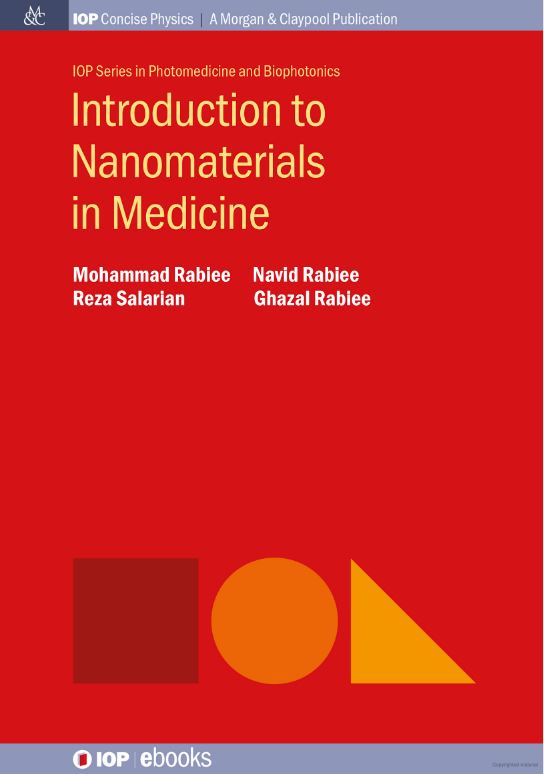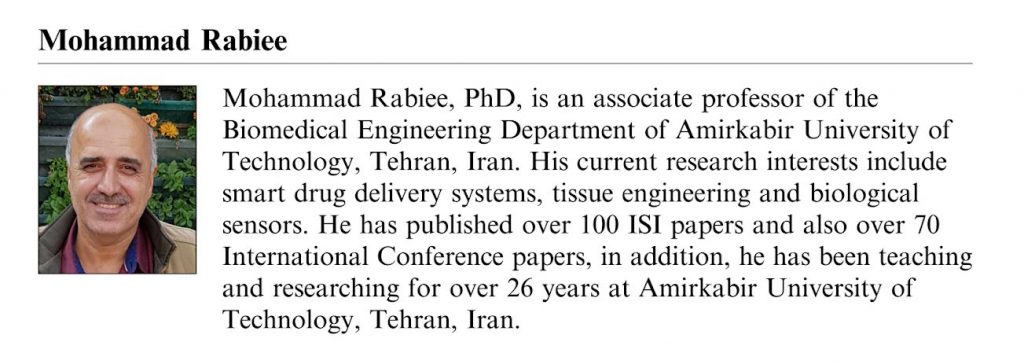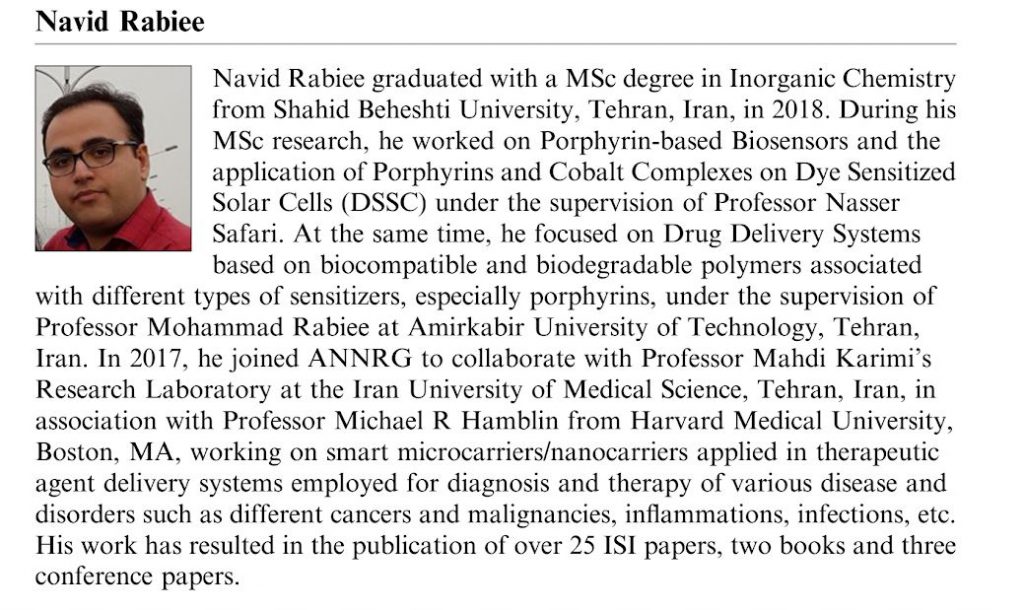
The book is published by IOP Publishing, in a joint collaboration between professors of Iran’s Amirkabir University of Technology (AUT) and Harvard University.
Titled ‘Introduction to Nanomaterials in Medicine‘, the book, considers the importance of nanomaterials and their application in medicine, as well as the significant growth of biomaterials in research fields, introduces the variables law (Rabiee’s theory) for the implementation of this research and the establishment of a proper strategy.
Do you want to Study in Iran?
Edu.Iran is the only reliable online source of advice and assistance for the international students wishing to embark on a course of higher education in the Islamic Republic.
About the Amirkabir University Professors

Mohammad Rabiee, PhD, is an associate professor of the Biomedical Engineering Department of Amirkabir University of Technology, Tehran, Iran. His current research interests include smart drug delivery systems, tissue engineering and biological sensors. He has published over 100 ISI papers and also over 70 International Conference papers, in addition, he has been teaching and researching for over 26 years at Amirkabir University of Technology, Tehran, Iran.

Navid Rabiee graduated with a MSc degree in Inorganic Chemistry from Shahid Beheshti University, Tehran, Iran, in 2018. During his MSc research, he worked on Porphyrin-based Biosensors and the application of Porphyrins and Cobalt Complexes on Dye Sensitized Solar Cells (DSSC) under the supervision of Professor Nasser Safari. At the same time, he focused on Drug Delivery Systems based on biocompatible and biodegradable polymers associated with different types of sensitizers, especially porphyrins, under the supervision of Professor Mohammad Rabiee at Amirkabir University of Technology, Tehran, Iran.
In 2017, he joined ANNRG to collaborate with Professor Mahdi Karimi’s Research Laboratory at the Iran University of Medical Science, Tehran, Iran, in association with Professor Michael R. Hamblin from Harvard Medical University, Boston, MA, working on smart microcarriers/nanocarriers applied in therapeutic agent delivery systems employed for diagnosis and therapy of various disease and disorders such as different cancers and malignancies, inflammations, infections, etc. His work has resulted in the publication of over 25 ISI papers, two books and three conference papers.

Reza Salarian, PhD, is an assistant professor of Biomedical Engineering of Maziar University, Noor, Iran. He also worked as a researcher at Amirkabir University of Technology, Tehran, Iran.

Ghazal Rabiee is an MSc student in Inorganic Chemistry with a major in Inorganic Catalysis at Shahid Beheshti University, Tehran, Iran. Her work has resulted in the publication of approximately four peer-reviewed journal articles and one book.
Do you want to Study in Iran?
Edu.Iran is the only reliable online source of advice and assistance for the international students wishing to embark on a course of higher education in the Islamic Republic.
Rabiee’s theory and the Nanotechnology
Advancement in the field of nanotechnology has revolutionized the field of medicines and pharmaceuticals in the twentieth century. The proper use of nanomaterials in medical applications requires a proper understanding of these compounds. This correct understanding, beyond the physical and chemical properties, must also have the correct logic of use. In other words, the strategic use of nanomaterials with applicable perspective can also help to advance research, but if we go forward with the current research perspective that leads to the expansion of inapplicable researches, the intrinsic importance of using these nanomaterials is eliminated.
This book, considering the importance of nanomaterials and their application in medicine, as well as the significant growth of biomaterials in research fields, introduces the variables law (Rabiee’s theory) for the implementation of this research and the establishment of a proper strategy.
Considering that the degree of number of biomaterial and host variables follow a variety factors, and by increasing the degree of number of biomaterials and host variables, the degree of total variables also increases and as a result, performance and, consequently, biomaterial behavior in the host environment will have less control and predictive capabilities. For an external substance that is supposed to be in the human body, it must be predictable and controllable.
In addition, according to the principle that the host in a fixed person does not have the ability to change, therefore, by using the simpler biomaterials (with less variables), the above goal is more accessible. It should be noted that in addition to observing biocompatibility tests for a biomaterial based on existing protocols and standards, the Applicable Compatibility (AC) parameter is also required in accordance with Rabiee’s theory. This book is written in accordance with Rabiee’s theory and the contents of this book should be evaluated from this perspective.




Thank you so much for valuable information.
I want to study in Iran any engineering university please guide.
Your welcome. Thank you for leaving a comment.
Please visit our Website http://www.edudotiran.com, send us your request by filling up the form in the Apply Now section.
Our counselor will get back to you after analyzing your Request Form.
Spread the Word!